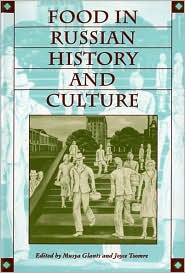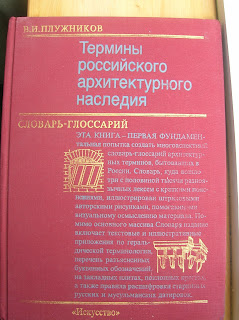Search This Blog
Wednesday, December 16, 2009
Beowulf and Honey
Monday, December 14, 2009
Give me some salted cabbage, no sauerkraut!
 I bought the December issue of Хлеб*Соль (Bread*Salt) because it advertised an interview with Valery Syutkin, whose music makes me feel happy and nostalgic. What's that tower of veggies on the cover? It's салат оливье (Olivier salad), the eternal "company's coming" dish made of finely diced potatoes, carrots, pickles, hard-boiled egg, green peas and the meat of your choice, all dressed with mayonnaise and lots of fresh herbs. That may not sound fantastic, but I've had iterations that were very tasty. My friend and mentor Alla Kornibad always added diced green apple. My mother-in-law dresses the salad with sour cream instead of the hated mayonnaise, which she claims is an urban abomination particular to Muscovites. All the wonderful advice I've received about rescuing Olivier from its many pitfalls is for naught - I won't be making it for New Year's or any other holiday.
I bought the December issue of Хлеб*Соль (Bread*Salt) because it advertised an interview with Valery Syutkin, whose music makes me feel happy and nostalgic. What's that tower of veggies on the cover? It's салат оливье (Olivier salad), the eternal "company's coming" dish made of finely diced potatoes, carrots, pickles, hard-boiled egg, green peas and the meat of your choice, all dressed with mayonnaise and lots of fresh herbs. That may not sound fantastic, but I've had iterations that were very tasty. My friend and mentor Alla Kornibad always added diced green apple. My mother-in-law dresses the salad with sour cream instead of the hated mayonnaise, which she claims is an urban abomination particular to Muscovites. All the wonderful advice I've received about rescuing Olivier from its many pitfalls is for naught - I won't be making it for New Year's or any other holiday. Monday, December 7, 2009
Lentils - чечевица, сочевица, сочево

I'm still interested in how the word сочевица morphed into чечевица (lentils). One book I ran across while searching is "Food in Russian History and Culture" - I'll have to pick this one up next time I'm home. I love the cover picture of people carrying boxed cakes. The Google Books preview brought up an interesting passage about disagreement in the Orthodox Church on the proper recipe for kutya.
Monday, November 16, 2009
Gogol-Mogol and the "M" Trick
Saturday, November 7, 2009
Mamalyga
Sunday, November 1, 2009
POSBON, the whole story
I did find out what the name of the funeral home ПОСБОН stands for: Производственное объединение специализированного бытового обслуживания населения
Here comes the full translation: Production Group for Specialized Life Services for the Public
Life Services?
Быт (life) is a strange word in Russian. It means everyday life, as in slogging through. Small towns still tend to have a Дом Быта, a building full of small businesses that cater to those annoying tasks every human faces: taking your clothes to get dry-cleaned, buying a new extension cord, getting your picture taken for a passport application, buying the specific, hard-to-find brand of cat food your vet recommends, getting the sole glued back on your shoe, etc.
Now that I re-read the above paragraph, I think I prefer the funeral homes that advertise as Ритуальные Услуги (ritual services).
Thursday, October 29, 2009
Lahmajoun, and a mystery herb revealed



Wednesday, October 28, 2009
Память на века
 "Погребение в мавзолее-усыпальнице: скидка - 5% с предъявлением этого купона"
"Погребение в мавзолее-усыпальнице: скидка - 5% с предъявлением этого купона"Friday, October 23, 2009
Лапша
According to Vasmer, лапша was borrowed from Tatar laksha, meaning little pieces of dough cooked in a stock.
Friday, October 2, 2009
Зачем вам столько гуталина?
Friday, September 25, 2009
Sakhalin Island and Buccaneer Physicians

Tuesday, September 22, 2009
On Possums
 В детстве мне казалось, что название нашей улицы обусловлено самой природой - в любой день здесь можно встретить по крайней мере три-четыре раздавленных опоссумов. Позже я узнала, что официально улица называется FM 1374 ("farm to market"). Но народное название очень стойкое, чему свидетельствует этот краеведческий знак.
В детстве мне казалось, что название нашей улицы обусловлено самой природой - в любой день здесь можно встретить по крайней мере три-четыре раздавленных опоссумов. Позже я узнала, что официально улица называется FM 1374 ("farm to market"). Но народное название очень стойкое, чему свидетельствует этот краеведческий знак.Monday, September 21, 2009
Indefinite Article


Sunday, September 20, 2009
Redneck Putdown
Monday, September 14, 2009
There's a roach!
Sunday, September 13, 2009
Findability
Monday, September 7, 2009
Vacation Vocabulary
 У нас официальный конец лета - Labor Day (первый понедельник в сентябре). В армии такие дни называют DONSA - day of no scheduled activity. Почты все, кого я видела в ресторанах и кафе на острове Галвестон сегодня, были одеты в стиле island casual или resort casual. Рестораторы в туристических городках используют эти формулировки, сочетающие в себе расслабленность и небольшой шик, чтобы народ не приходил в мокрых купальниках. К сожалению, судя по пустым пляжам, многие в Хьюстоне решили ограничится staycation - то есть, дома сидели.
У нас официальный конец лета - Labor Day (первый понедельник в сентябре). В армии такие дни называют DONSA - day of no scheduled activity. Почты все, кого я видела в ресторанах и кафе на острове Галвестон сегодня, были одеты в стиле island casual или resort casual. Рестораторы в туристических городках используют эти формулировки, сочетающие в себе расслабленность и небольшой шик, чтобы народ не приходил в мокрых купальниках. К сожалению, судя по пустым пляжам, многие в Хьюстоне решили ограничится staycation - то есть, дома сидели.
Wednesday, August 26, 2009
How to Dig
Monday, August 24, 2009
Natural
Sunday, August 23, 2009
Hooliganism, Part II
Thursday, August 20, 2009
Horses
Sunday, August 16, 2009
Schlumberger to the Rescue
Tuesday, August 11, 2009
Унитаз
My son was very approving - "I like that унитаз (oo-nee-TAZ, "toilet bowl") you bought!"
After I set him straight about the big difference between taz and unitaz, I started digging around to find out where the word came from. My usual first source (who conveniently sits across the table from me at breakfast) suggested that унитаз is short for универсальный таз (all-purpose basin). I knew - no, I had to believe - that he was wrong.
And he was!
I soon uncovered a very entertaining article on the invention of the flush toilet. The article is attributed to Twyford Bathrooms, but it isn't posted on the company's site. Twyford's site does, however, confirm that Thomas Twyford invented the "unitas" in 1883. The prefix uni- was chosen because it was the first one-piece toilet. What about -tas? I guess that was a prudent euphemism. The OED has entries for the word "tass" (meaning a cup or small goblet) dating back to the 15th century.
As the artice concludes, "The Unitas was shipped into Russia and the name UNITAS became the Russian word for WC!"
And how convenient that the trade name dovetailed so nicely with a Russian word that made the shape (if not the purpose) of the new product very clear! That's all I have to say about унитаз.
Таз, by the way, came into Russian and lots of other languages from Persian via Turkish. The OED says that the immediate ancestor of tass in English is, of course, tasse in French, but it also ultimately traces the word back to Arabic and Persian, where it meant cup or goblet.
Thursday, August 6, 2009
Решето
 We bought a sunflower head at the market today - now we'll have to dry it and then pull the seeds out and toast them.
We bought a sunflower head at the market today - now we'll have to dry it and then pull the seeds out and toast them. Tuesday, August 4, 2009
Architecture Glossary
 Плужников В.И. "Термины Российского Архитектурного Наследия" Москва, "Исскуство" 1995
Плужников В.И. "Термины Российского Архитектурного Наследия" Москва, "Исскуство" 1995Wednesday, July 29, 2009
Лисички
 These are my favorite mushrooms - лисички (lee-SEECH-kee, chanterelles). We have found baskets and baskets of them in the mountains east of Seattle and I always buy them at the market when we're in Russia.
These are my favorite mushrooms - лисички (lee-SEECH-kee, chanterelles). We have found baskets and baskets of them in the mountains east of Seattle and I always buy them at the market when we're in Russia. | Russian common name | Scientific name | English common name |
| Шампиньон | Agaricus silvaticus | Button mushroom |
| Шампиньон тонкий, Шампиньон желтокожий | Agaricus xanthoderma | Poison yellow meadow mushroom |
| Лисичка | Cantharellus cibarius | Chanterelle |
| Лисичка ложная | Hygrophoropsis aurantiaca | False chanterelle |
| Лисичка серая | Craterellus sinuosus | Chanterelle |
| Белый гриб | Boletus edulis | Porcini, king bolete |
| Бледная поганка | Amanita phalloides | Death cap |
| Мухомор красный | Amanita muscaria | Fly agaric |
| Мухомор поганковидный | Amanita citrina | False death cap |
| Подберезовик белый | Leccinum aurantiacum | Brick cap, red cap bolete |
| Подберезовик обыковенный | Leccinum scabrum | Birch bolete |
| Масленок поздний | Suillus luteus | Slippery Jack |
| Масленок зернистый | Suillus granulatus | Weeping Bolete, granulated slippery jack |
| Моховик пестрый | Xerocomus chrysenteron | Red Cracking Bolete |
| Моховик зеленый | Xerocomus subtomentosus | Suede Bolete |
| Навозник серый | Coprinus atramentarius | Tippler’s bane |
| Навозник белый | Coprinus comatus | Shaggy ink cap |
| Навозник рассеянный | Coprinus disseminatus | Fairy ink cap |
| Навозник мерцающий | Coprinus micaceus | Glistening ink cap |
| Навозник складчатый | Coprinus plicatilis | Pleated ink cap |
| Вешенка устричная | Pleurotus ostreatus | Oyster mushroom |
| Вешенка беловатая | Pleurotus pulmonaris | Pale oyster |
| Сыроежка пищевая | Russula vesca | Bare-toothed russula |
| Сыроежка зеленая | Russula aerguinea | Tacky green russula |
| Сыроежка сине-зеленая | Russula cyanoxantha | Charcoal burner |
| Сыроежка сереющая | Russula decolorans | Graying Russula |
| Подгруздок белый | Russula delica | Short-stemmed russula |
| Подгруздок черный | Russula adusta | Wine-cork brittlegill |
| Опенок осенний | Armillaria mellea | Honey or oak mushroom |
| Опенок луговой | Marasmius oreades | Fairy-ring mushroom |
| Опенок зимний | Flammulina velutipes | Velvet foot (Enokitake) |
| Опенок серно-желтый | Hypholoma fasciculare | Sulfer tuft |
| Опенок летний | Kuehneromyces mutabilis | Sheathed wood tuft |
| Опенок Кандоля | Psathyrella candolleana | Pale brittlestem |
| Опенок темный | Armillaria ostoyae | Honey mushroom |
| Рядовка | Tricholoma caligatum | Booted tricholoma |
| Рядовка белая | Tricholoma album | White knight |
| Рядовка буро-желтая | Tricholoma fulvum | Birch knight |
| Свинушка тонкая | Paxillus involutus | Brown roll rim, poison pax |
| Головач продолговатый | Calvatia excipuliformis | Pestle puffball |
| Дождевик | Calvatia gigantea | Giant puffball |
| Дождевик шиповатый | Lycoperdon perlatum | Common puffball |
| Сморчок высокий | Morchella elata | Black morel, fire morel |
| Сморчок обыкновенный, настоящий | Morchella esculenta | Yellow morel, white morel |
| Сморчковая шапочка | Verpa bohemica | False early morel, spring verpa |
| Ежовик желтый | Hydnum repandum | Hedgehog mushroom |
| Майтаке, грифола курчавая, гриб-баран | Grifola frondosa | Sheep’s Head (Maitake) |
| Строчок обыкновенный | Gyromitra esculenta | False morel, brain mushroom |
| Строчок гигантский | Gyromitra gigas | Snowbank false morel |
| Рогатик гребенчатый, клавулина гребенчатая, коралл гребешковый | Clavulina cristata | Crested coral fungus |
| Свиное ухо | Gomphus clavatus | Pig’s ear gomphus |
| Рыжик | Lactarius deliciosus | Delicious milk cap |
| Трутовик настоящий | Fomes fomentarius | Hardwood conk |
